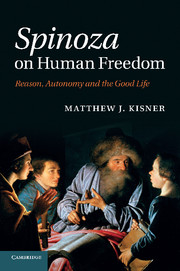Book contents
- Frontmatter
- Contents
- Abbreviations and translations
- Acknowledgments
- Introduction: Beyond therapy
- 1 Freedom as rationality
- 2 Justifying Spinoza's conception of freedom
- 3 Autonomy and responsibility
- 4 Freedom and happiness
- 5 The good
- 6 The natural law
- 7 Benevolence
- 8 The free man
- 9 Rational deliberation
- 10 The character of freedom
- 11 The freedom of the citizen
- Conclusion: “The true freedom of man”
- Bibliography
- Index
6 - The natural law
Published online by Cambridge University Press: 01 March 2011
- Frontmatter
- Contents
- Abbreviations and translations
- Acknowledgments
- Introduction: Beyond therapy
- 1 Freedom as rationality
- 2 Justifying Spinoza's conception of freedom
- 3 Autonomy and responsibility
- 4 Freedom and happiness
- 5 The good
- 6 The natural law
- 7 Benevolence
- 8 The free man
- 9 Rational deliberation
- 10 The character of freedom
- 11 The freedom of the citizen
- Conclusion: “The true freedom of man”
- Bibliography
- Index
Summary
Having considered Spinoza's view of our good, we can now turn to reason's guidance for obtaining it. One might expect reason's practical guidance to be very specific, since the best course of action likely depends on the particular circumstances; for instance, while it is usually in our best interests to exercise, there are times when it may not be, say, when recovering from an injury. Yet Spinoza holds that reason dictates practical laws, in other words, universal rules for action, which are the subject of this chapter. The first section examines Spinoza's discussion of practical laws, arguing that they are best understood as natural laws. The second section considers why reason would dictate lawlike commands. The section answers that reason, for Spinoza, requires us to adopt a kind of impartial perspective that does not attend to particular properties or one's position in space and time. The final section considers how Spinoza's view of the natural law bears on his view of autonomy. Since rationality consists in following impartial and universal rules for action, it follows that our autonomy does as well, a view that bears an unmistakable resemblance to Kant. The section examines this resemblance, arguing that Spinoza's ethics provides a different philosophical framework for defending claims often identified with Kantian ethics, that we become autonomous by being moral and that autonomy is the basis of morality.
- Type
- Chapter
- Information
- Spinoza on Human FreedomReason, Autonomy and the Good Life, pp. 112 - 134Publisher: Cambridge University PressPrint publication year: 2011



